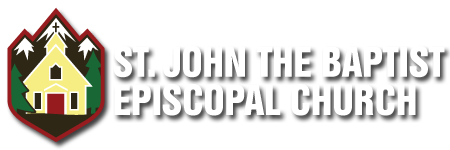Who were the people who gave the items we regularly use in worship?
Credence table, A gift of Esther Albee, 1915
We do not know much about those who gave various items over the years to adorn our church and enrich our worship, nor do we even know all of their names. A number of items were donated at the dedication service on March 13, 1892: the altar, the lectern and a chalice, for example. However, we do know a bit about the donor of two items which are used regularly in our worship: the credence table and baptismal font.
The credence table installed along the wall to the right of the altar has been in service since Easter 1915. It is made of oak, with an inset profile of a cross and five floral medallions across the base. The table was given in memory of Bishop Franklin Spencer Spalding (1865-1914), Bishop of Utah and the Western Missionary District with oversight of Colorado west of the Continental divide. He was the son of the first bishop of Colorado, John Franklin Spalding, who presided at the dedication of St. John the Baptist Episcopal Church in 1892.
Our Baptismal Font
Although no memorial plaque can be found on the baptismal font, the wood material and detail of the font match quite closely those of the 1915 credence table. The font is crafted of oak with an inset stainless bowl below a removable cover. Sixteen floral medallions of carved or stamped wood encircle the base just below a ring of 24 small rounded trefoil arches.
The donor of the credence table (and likely the baptismal font) was Esther (Mrs. A. F.) Albee, who was born in England in 1863. Both Esther and her husband Fred were members of St. John’s and are listed on our treasured Memorial Scroll. Esther supervised the Four Leaf Clover Club, a children’s organization of the church. Fred died at age 53 shortly after this credence table was dedicated. At the time Esther made this gift, her home country of England was engaged in the Great War. Whether she had nephews or other relatives involved in that conflict is unknown.
The flowers left thick at nightfall in the wood
This Eastertide call into mind the men,
Now far from home, who, with their sweethearts, should
Have gathered them and will never do again.
In Memoriam (Easter, 1915), Edward Thomas


